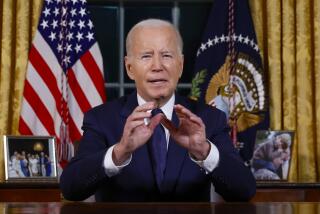Upsetting the Balance : THE SWORD AND THE DOLLAR Imperialism, Revolution and the Arms Race <i> by Michael Parenti (St. Martin’s Press: $16.95; 210 pp.) </i>
- Share via
The thrust and spirit of this book is acknowledged in the introduction, where the author says that although some will call him an extremist, “the extremists are already in power.” From there on, his volume is a steadily unfolding indictment of the U.S. government and its policies, more or less what Karl Marx would present to a grand jury if he were a circa 1989 assistant U.S. attorney.
As a result, the book is difficult to take seriously as anything resembling political science, despite the author’s Ph.D. in that field from Yale. This is a break for conservatives and multinational corporate executives because half to two-thirds of Parenti’s argument involves an unusual Marxian analysis of capitalist self-interest as the principal dynamic behind U.S. foreign policy--and there is at least something to what he says.
Just how much, though, will probably have to await someone else’s book. Parenti’s volume is essentially a polemic, albeit flavored with scholarship and sprinkled with footnotes. From the first, I found myself shaking my head at some citation and turning to the notes at the end of the chapter, only to find sources like New York’s Monthly Review Press, International Publishers, Progress Publishers of Moscow and the like. One has visions of gray East Bloc bookstores and Upper West Side of Manhattan coffeehouses.
This is not so much a quibble as it is a dismissal. Parenti leads off with an indictment of imperialism that raises pointed questions about how much U.S. multinational corporations allegedly take out of the Third World today, and how much their British, Dutch and other forebears bled out of Africa and Asia in years gone by. But to make and document this case--which has elements of validity--would require at least 50 serious, detailed pages. Parenti instead offers a warped and quick overview of African and Indian history from a couple of leftist tomes. And he also touches most of today’s familiar anti-imperialist bases, citing, for example, one Israeli writer’s thesis: “Consider any third-world area that has been a trouble spot in the past 10 years and you will discover Israeli officers and weapons implicated in the conflict--supporting American interests and helping in what they call ‘the defense of the West.’ ”
But the most flawed aspect is Parenti’s inability to develop an even-handed comparative assessment of U.S. and Soviet imperialisms. The reason, in a nutshell, is that Parenti doesn’t think even-handedness is warranted because Moscow just really isn’t all that imperialist, principally because the Soviets aren’t capitalist. Capitalism and imperialism apparently underpin each other, which would have been news to Alexander the Great, Xerxes and the Caesars. Now Parenti’s is a viewpoint that can be held, but in the United States it is very much a fringe attitude, and a writer so indulging himself is not going to make a very effective case to the average American reader, even those ready to stipulate that U.S. foreign policy does have obvious capitalist leanings and loyalties.
Moreover, parts of Parenti’s “history” are just plain inadequate, like his feckless view of government-organized East Bloc “peace rallies” or his insistence that the Soviets have not been imperialist in Eastern Europe because they have not practiced economic expropriation. He could use a refresher on how the Russians carried off Eastern European scientists, equipment and even whole factories after World War II, as well as an update on Moscow’s current dictation of trade terms. But probably the refresher would be pointless because he dismisses the notion that the Soviets have a military-industrial complex like the one he perceives in the United States, and he argues that “the U.S. intervenes to prevent fundamental changes in the social relations and class structures of Third World countries, while the Soviets intervened in Afghanistan to support the forces that were supporting such change, meeting a fierce resistance from Islamic reactionaries, feudal landowners, tribespeople, and opium growers, a resistance richly supported with hundreds of millions of dollars in U.S. aid and weapons.”
Given these shortcomings, the literary opportunity for some neo-Marxist scholar to write a serious neo-Marxian profile of U.S. foreign relations and overseas military policy as an auxiliary of “U.S. capitalism” still exists. It exists because Parenti himself instead chose to write a book that too often shades into a comparative preference for the interest group structure and foreign policy of the Soviet Union relative to that of the United States.
More to Read
Sign up for our Book Club newsletter
Get the latest news, events and more from the Los Angeles Times Book Club, and help us get L.A. reading and talking.
You may occasionally receive promotional content from the Los Angeles Times.









